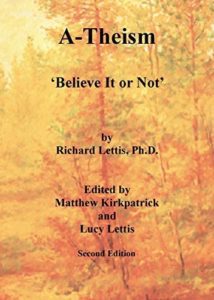Author: Richard Lettis (Islands Press, New York, NY, 2020) Reviewed by Theresa Forsman

In the year before his death in 2017, retired literature professor Richard Lettis compiled many of his thoughts on atheism, as well as the convictions of philosophers, poets, and scientists, living and dead, on the topic. The result is “A-Theism: Believe It or Not,” a paperback published by Islands Press last month (available on Amazon), with editing assistance from writing professor Matthew Kirkpatrick and the author’s widow, Lucy Lettis.
In a conversational tone, Lettis provides an overview of the theism vs. atheism debate, including its psychological, philosophical, historical, legal, and scientific components. High-profile 20th Century non-believers, including Sam Harris, Christopher Hitchens, and Richard Dawkins, are quoted, as well as historical figures including Epicurus and Thomas Jefferson, and current writers, both academic and in the popular press. The author draws on his English literature background in making his case for atheism, with references to legendary writers including Jane Austen, Emily Dickinson, Flannery O’Connor, and John Milton.
We find out that atheism is growing both nationally (currently 3.1 percent in the U.S.) and globally (more than 13 percent), that those claiming “no religion” make up nearly a quarter of the U.S. population, and that atheists are not the social pariahs they were just a few decades ago. One chapter delves into the demographics of the atheist community—compared to the general population, atheists are more likely to be male, young, white, and to have a college degree.
Struggle for acceptance
In several places, Lettis compares atheists’ struggle for acceptance to the gay-rights movement and, in pointing out that a cause benefits from celebrity attention, the author provides a list of celebrity atheists from A (Woody Allen) to almost Z (Steve Wozniak).
Lettis tells us that he, like the great majority of atheists, was brought up in a traditional religion, in his case the Methodist church. But once children grow up, he points out, they encounter different ways of thinking, often at school or in their social life, and “undertake the beginnings of actual thinking as opposed to compliance by custom.”
The book touches on many arguments, including creationism vs. intelligent design, the good deeds vs. the wrongdoings committed in the name of religion, choosing ethical behavior vs. blind obedience.
‘But now we have science’
The arguments for atheism gain strength as our scientific knowledge expands, Lettis says. “In the time before science, when we had so little ability to understand and deal with reality, and so much to fear and to suffer, the picture of a congenial earth and a protecting father gave great comfort and consolation. And belief in a deity still provides comfort to those suffering something unbearable, “ he says. “But now we have science. …Science brings reality, and if we feel that to be essential, the theist’s imagined pleasures come at too high a price.”
“A-Theism” is likely to appeal to confirmed atheists who want to delve into the history and philosophy of the topic, including various schools of thought within atheism, and to those heretofore lifelong believers who may be questioning and therefore want to know more about the case for not believing.
Theresa Forsman is a member of the Ethical Culture Society of Bergen County.


